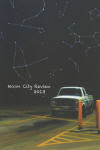Moon City Review – 2013
Is it backhanded to say that most of Moon City Review 2013 is promising? The truth is, the issue is eclectic and accessible. The prose narratives tell their stories in a straightforward manner that hold my attention, and the poems leave little doubt as to the image or sentiment they’re driving for. But as I read, I often find myself wishing that many of these pieces had received one more editorial pass: so little separates them from promising to satisfying.
Is it backhanded to say that most of Moon City Review 2013 is promising? The truth is, the issue is eclectic and accessible. The prose narratives tell their stories in a straightforward manner that hold my attention, and the poems leave little doubt as to the image or sentiment they’re driving for. But as I read, I often find myself wishing that many of these pieces had received one more editorial pass: so little separates them from promising to satisfying.
For example: Neil Mathison’s essay “Dodd Narrows” chronicles several hours of navigation through a strip of sea. The pacing is elegant, the tone reflective. The bursts of brilliance are breathtaking—“[I]f the water is still . . . reflections double the world”—but they never tip into pretension or sideshow, keeping their place as vassals to the narrative. Toward the end, however, the essay veers sharply from the course it has charted for the reader: the central drama occurs in flashback, and on land. The last few paragraphs attempt to tie together the threads, but they feel rushed, and not quite deserving of the loveliness that came before.
It has been a long time since anything in a literary magazine has gripped me like Joe Meno’s “Janice Goes Swimming.” The story opens with a masterful blow-by-blow account of violence, and what is astonishing is how it paints an entire life through interior monologue, in one paragraph spanning four pages, in the middle of an action sequence, and in the beginning of the story. These are all risky choices, and I lap it all up. By the time Janice limps home after the robbery in the first section, I am convinced that she will break out of her ho-hum existence, and I can’t wait to find out how. The tension even carries through to the languid days that Janice passes in Mexico, and the humor is subtle. It has action, it has heart. Which is why I wish the ending were more than what it is: an ambiguous coda that leaves me feeling that Janice’s dilemma is the same as it has always been, and that the author hasn’t made a decision about where she’s going.
The poems are similarly uneven. The mundane details in Jeff Alfier’s “Black Hawk Crash, Tal Afar, Iraq, 2006”—if the details of any war can be described thus—steer the poem away from sentimentality and accentuate its desperation and loneliness. By its title, Peycho Kanev’s “Eternal Circle” seems to announce a grandiose idea, and the poem itself reads like Frank O’Hara on a sad day. I wonder if Francine Witte’s “Probably” ended too early; the speaker spends the poem’s first twenty-three lines describing how a breakup wears on her father and mother, and only at the end of the penultimate line disrupts expectations with the fabulous, and mysterious, “he was / probably drinking a toast to himself.” On one hand, the poem quits while it’s ahead, but I feel as if I had been cut off three-quarters of the way through a Law and Order episode, when events take a surprising turn. So much waits to be unpacked in that toast, and the poem has already ended.
Other poems never quite get off the ground. In “The Triggering Town,” Richard Hugo admonishes: don’t get stuck on the triggering subject of the poem, or else you will run out of things to say. Travis Mossotti’s “Totem” and Charity Gingerich’s “Beauty Is a Mountain We See When Driving Our Car” both seem stuck on their triggering ideas. They want to impart a lyrical feeling, but without shedding that desire—not to mention Hallmarkish phrases such as “My heart is ringing its little bell”—the reader discovers nothing she doesn’t already know and remains unmoved.
Like “Dodd Narrows,” the exquisite, intuitive pacing and no-nonsense narration of Renée K. Nicholson’s “In Sickness” draw the reader into the heart of the writer’s experience. Nicholson reminds you time and again, however, that she is “keeping you at arm’s length” even when she is telling you how an illness has snatched away her most cherished wish. This authorial voice interrupts constantly, and I can’t decide whether it is annoyingly self-conscious or whether it lends the piece a bitter quality that becomes its essence. The authorial and narrative voices, though, both ring true: I do believe that that is how she feels, and no test other than honesty is required of one’s feeling.
Read Moon City Review 2013 for a good effort, straightforward voices, and the occasional delightful weirdness. Expect a few bumps on the road in the forms of typos, clichés, abstractions that cry out for unpacking, and the pedantic hoping to pass for beauty—but, and especially if you’re a writer, you may decide that their lessons are worth the time.
[mooncitypress.com]





